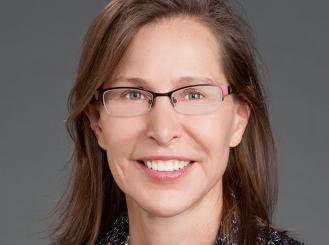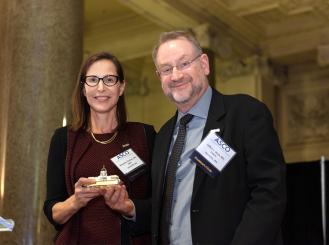Sep 01, 2020
Alexandra Thomas, MD, FACP, is The Williams Family Professor of Breast Oncology and the Breast Cancer Disease-Oriented Team leader at Wake Forest Baptist Health, roles she has held for 4 years. Before joining Wake Forest Baptist Health, Dr. Thomas led the breast cancer program at the University of Iowa. She is a member of the ASCO Government Relations Committee, the ABIM-ASCO Breast Test Materials Development Subcommittee, and the ASCO Annual Meeting Education Committee. She participated in the ASCO Leadership Development Program in 2017-2018. She was recognized as the 2018 ASCO Advocate of the Year for her exceptional contributions and commitment to health care policy and advocacy.
How did you initially choose your current career path? Were there any unexpected detours along the way?
AT: After residency, while my husband completed his training, I worked part-time in academic general internal medicine and had three children. When our youngest started school I resumed training and completed my medical oncology fellowship.
Having served on the clinical faculty for 5 years, it could have been awkward for me to rejoin the training ranks when I became a hematology oncology fellow at the University of Iowa. (My department chair still reminds me that I was the only associate professor ever to do a fellowship.)
Dr. Brian K. Link, the leader of the lymphoma program, however, saw this as just another pathway and not only offered tremendous teaching and mentorship, but also quickly involved me in his research endeavors. This work, more than anything else, helped me transition into an academic medical oncologist. Here I learned to think about the patient in front me as well as about the other patients who will follow and to think more broadly about how we might improve cancer outcomes. Since fellowship, I have been able to focus on the care of patients with breast cancer, but I relish that my first ASCO abstract was in lymphoma. This work was presented in an Oral Abstract Session and I received an ASCO Merit Award.
Brian’s guidance and mentorship gave me confidence that someone with an uncommon career trajectory could contribute to oncology. This in turn spurred my career-long commitment to thinking broadly about how we might help individual patients as well as the populations we care for and, in addition, meaningfully serve our communities. Advocating for public support to improve cancer outcomes has become a vital part of my work.
My trajectory has been touched by kindness and generosity at so many points. My indirect and less common career path has worked for me and allowed me to prioritize family and still have immense professional satisfaction.
What led to your initial interest and involvement in government relations, health policy, and advocacy?
AT: I have always had an interest in health policy, having majored in international relations and public policy as an undergraduate. I became deeply involved in policy and advocacy first when I served as Faculty Senate President at the University of Iowa. In this role, at a public institution, I worked with elected officials and regularly conveyed the importance of robust public higher education in our state. After this invaluable experience I returned to where my true passion lies and focused my advocacy efforts toward improving lives of patients and families impacted by cancer.
What was the first policy issue that you felt truly engaged on, or an issue where you felt like your actions made a difference?
AT: My first true advocacy success came in higher education. As Faculty Senate President at the University of Iowa, my fellow officers and I successfully worked with elected officials, including our governor, and advocated against threatened budget cuts to the university.
In oncology, it has been particularly meaningful to advocate for reforms to the prior authorization system, as this is a practical matter which can be addressed with realignment of incentives and ultimately allow us to direct resources to patient care rather than to bureaucratic processes.
Describe your typical workday.
AT: While I have two very distinct type of days, clinic days and academic days, they each inform the work I do on the other days. My clinic days are all-consuming, as I see patients with breast cancer and work with trainees. My academic days are busy in a quieter, more cerebral way, and are filled with creative time for writing manuscripts and grants, as well as time for meetings. The goal of this time is to think broadly about how we might collectively improve outcomes for patients with cancer, be this through translational work, a clinical trial, or meeting with elected officials and engaging the public on the importance of advancing cancer care.
If you have to pick one aspect, what part of your job is your favorite?
AT: Wow—it is very tough to select a single part of my job, but if I must pick, I would of course select patient care, which is the very reason many of us begin on this journey in medicine. It is a true privilege to guide someone else through the experience of having a serious illness and to advocate for them. In addition, for me, the role of advocating for women, hearing their stories, and watching their stories evolve over time is a particularly joyful experience.
What do you wish you had known before you chose your career path?
AT: Honestly, I have been so grateful for my indirect career path, there is little I wish I would have known. If there is one thing, perhaps it is that you can have a family, and that this can enrich your career rather than detract from it.
What kind of person thrives in this professional environment (meaning both your career and your advocacy work)?
AT: I do not know that there is any one kind of person who thrives in academic medicine. There are many valuable skill sets and personality types that can contribute to our work. In fact, it may be a mix of personalities which serves us best.
With regard to advocacy, I would not underestimate the value of a medicine skill set. We are trained to listen while obtaining a history and physical exam, get the details, think through the problems, and come up with an assessment and plan. We are also trained to work with a wide range of people, with wide-ranging opinions. These skills can be invaluable as we work with elected officials and listen to their perspectives and often help them see where allocating resources to improving outcomes in cancer aligns well with their goals.
What do you wish more oncology professionals knew about health policy and advocacy?
AT: I wish more oncology professionals knew that advocacy does not equate with politics. I certainly shied away from the groundwork of policy because of the highly partisan nature of politics at the moment. I suspect many physicians might, as confrontation is not often part of our culture. However, health policy and advocacy are not synonymous with politics. In fact, it is often just the opposite—elected officials from all parts of the political spectrum would like to contribute to ASCO’s mission of a world with less suffering from cancer and are surprisingly willing to listen to our guidance on how to achieve this.
What advice would you give to an early-career oncologist about getting involved in the policy issues affecting their community, state, or country?
AT: I would advise them to have fun and find joy in the parts that might at first seem more challenging. This work is more rewarding than you might expect, and you will also enjoy meeting people from different political perspectives more than you might expect. For me, as I have done this, I have come to increasingly recognize that it is critical for health care providers to participate in shaping the values of our community. It might be easy, again because of the perception that this is “politics,” to shy away from this role, but if we do, our valuable voice, advocating for our patients, will not be part of the conversations on how we will allocate our public resources.


